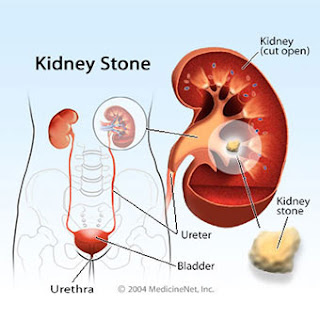Signs & Symptoms That You May Have Kidney Stones
Hardly will you not find in the news one person infected with kidney stones. Here is an article we saw on healthline and we recommend it to you.
Kidney stones are hard collections of salt and minerals often made up of calcium or uric acid. They form inside the kidney and can travel to other parts of the urinary tract.
Stones vary in size. Some are as small as the period at the end of this sentence — a fraction of an inch. Others can grow to a few inches across. Some kidney stones can become so large they take up the entire kidney.
A kidney stone forms when too much of certain minerals in your body accumulate in your urine. When you aren’t well hydrated, your urine becomes more concentrated with higher levels of certain minerals. When mineral levels are higher, it’s more likely that a kidney stone will form.
Smaller kidney stones that remain in the kidney often don’t cause any symptoms. You might not notice anything is amiss until the stone moves into your ureter — the tube that urine travels through to get from your kidney to your bladder.
Kidney stones are typically very painful. Most stones will pass on their own without treatment. However, you may need a procedure to break up or remove stones that don’t pass.
8 signs and symptoms that you may have kidney stones.
1. Pain in the back, belly, or side
Kidney stone pain — also known as renal colic — is one of the most severe types of pain imaginable (2). Some people who’ve experienced kidney stones compare the pain to childbirth or getting stabbed with a knife.
The pain is intense enough to account for more than 1 million visits to emergency rooms each year (3).
Usually the pain starts when a stone moves into the narrow ureter. This causes a blockage, which makes pressure build up in the kidney.
The pressure activates nerve fibers that transmit pain signals to the brain.
Kidney stone pain often starts suddenly. As the stone moves, the pain changes location and intensity.
Pain often comes and goes in waves, which is made worse by the ureters contracting as they try to push the stone out. Each wave may last for a few minutes, disappear, and then come back again.
You’ll feel the pain along your side and back, below your ribs. It may radiate to your belly and groin area as the stone moves down through your urinary tract.
Large stones can be more painful than small ones, but the severity of pain doesn’t necessarily relate to the size of the stone. Even a little stone can be painful as it moves or causes a blockage.
2. Pain or burning during urination
Once the stone reaches the junction between the ureter and bladder, you’ll start to feel pain when you urinate (4). Your doctor might call this dysuria.
The pain can feel sharp or burning. If you don’t know you have a kidney stone, you might mistake it for a urinary tract infection. Sometimes you can have an infection along with the stone.
3. Urgent need to go
Needing to go to the bathroom more urgently or frequently than usual is another sign that the stone has moved into the lower part of your urinary tract. You may find yourself running to the bathroom, or needing to go constantly throughout the day and night.
Urinary urgency can also mimic a urinary tract infection symptom.
4. Blood in the urine
Blood in the urine is a common symptom in people with urinary tract stones (5). This symptom is also called hematuria.
The blood can be red, pink, or brown. Sometimes the blood cells are too small to see without a microscope (called microscopic hematuria), but your doctor can test for this symptom.
5. Cloudy or smelly urine
Healthy urine is clear and doesn’t have a strong odor. Cloudy or foul-smelling urine could be a sign of an infection in your kidneys or another part of your urinary tract.
One study found that about 8 percent of people with acute kidney stones had a urinary tract infection (6).
Cloudiness is a sign of pus in the urine, or pyuria (7). The smell can come from the bacteria that cause urinary tract infections. An odor may also come from urine that’s more concentrated than normal.

Comments
Post a Comment